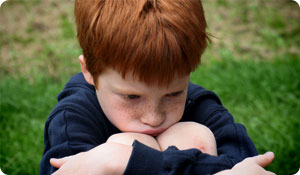
To spank or not to spank... that is the question. The answer, it turns out, can be as complex as the reasons for doing it.
For several generations spanking has been a topic of controversy in this country but studies show more than half of all U.S. parents condone spanking as a regular form of punishment.
According to Martha Wadsworth, Ph.D., an associate professor of child clinical psychology at the University of Denver, 90 percent of U.S. parents admit to regularly spanking their children though it is illegal in 24 other countries including: Austria, Denmark, Finland, Germany, Israel, Italy, Norway, and Sweden. "Ironically, being American is one of the best predictors of being a spanker," says Wadsworth who specializes in children's behavior.
Spanking has been widely investigated by an array of experts and the evidence against it is overwhelming. In particular, Wadsworth points up a study that reveals kids who are spanked at least once per week have higher rates of aggression and delinquent behavior, more mental health problems such as depression and poorer competence. "Another series of studies has found a strong association between spanking and lower IQ scores," quotes the professor. Hundreds of studies basically come to the same conclusions:
- 1. Children who receive physical punishment become more aggressive.
- 2. Spanking plants seeds for later violent behavior as children who are spanked are more likely to be abusive toward their own children.
- 3. Spanking doesn't work.
"The effects of spanking on children's development are pretty clear but not necessarily straightforward," Wadsworth explains admitting that while spanking results in immediate compliance, it will not prevent a recurrence of the naughty behavior. "Spanking may send the message that throwing a toy when you're angry is not okay, but it doesn't guarantee the bad behavior won't be repeated."
More distressing perhaps is what it does teach. Among other things, spanking demonstrates that it's all right for stronger people to hit weaker people.
"Children learn that the way to solve a problem is by hitting," says Wadsworth noting that a child whose behavior is spank controlled is likely to interact this way with siblings, peers and eventually a spouse and offspring. Even for parents who hug more than they hit since a child isn't likely to forget the hurt. "When spanking is done out of anger, it teaches children to fear their parents," cautions Wadsworth. "Following that path is a road that rarely leads to a close parent/child relationship."
But all spanking is not equal, according to Alan E. Kazdin, Ph.D., John M. Musser professor of psychology at Yale University and director of Yale's Parenting Center and Child Conduct Clinic. Last May (2010), the American Psychological Association (APA) spoke with Kazdin who is also the author of many professional-audience books on child psychology and behavior.
Kazdin reports that research on very mild, infrequent spanking (for example, one time per month) is inconclusive. "When a parent moves beyond infrequent spanking to moderate or severe physical punishment, there are all sorts of untoward consequences but other forms have not been widely studied." Still, Kazdin advises parents to avoid physical punishment altogether. "There are simply more effective ways to teach and discipline your child," he says.
Wadsworth agrees and adds that good parenting goes beyond correcting bad behavior on the spot. "Our job as parents means teaching children not only what not to do, but also what to do instead."
Discipline Dos
When naughtiness strikes, many parents resort to spanking as the quickest, easiest solution. Here, some alternative forms of more-effective discipline:
- Lower your voice. Scream and your child will tune out. Period. Next time, try correcting the bad behavior with a whisper and see if that doesn't get his attention.
- Look below the surface. Figure out what she's really upset about. Take a deep breath when your toddler angrily scribbles all over her brother's work of art. Calmly get down to her eye level and in spite of your anger, try expressing empathy. It will validate your child's feelings and diffuse the power struggle.
- Don't punish for what he did wrong without instructing him how to do it right. Kids don't instinctively know how to behave. You may have to explain why the behavior is unacceptable multiple times before it permanently sinks in.
- Point up good behavior. A few encouraging words will motivate your child to keep up the good work.
Sources:
Interview with Martha Wadsworth , Ph.D
Lab Website: http://www.du.edu/psychology/CoPES>
The American Psychological Association
http://www.apa.org/news/press/releases/2010/05/corporal-punishment.aspx





